Enab Baladi – Saleh Malas
“Following my graduation from the Faculty of Mass Communication at Damascus University, I joined a competition to appoint teaching assistants, in which admission is usually limited to those with high-grade point averages and is based on an oral interview that is often decided either by the applicant’s relationship with the members of the Committee that will meet with them, or the status of their influential family in the country. Oftentimes, this type of competition is a cover for entering and passing on the names of specific students who are related to official figures and officials”.
Salma, 34, describes her struggles in overcoming a series of complex difficulties in her postgraduate study journey at Damascus University to earn a master’s degree in the Radio and Television Department at the Faculty of Mass Communication in 2012, although there were no doctoral studies department at the time.
In her interview with Enab Baladi, Salma viewed these difficulties as an obvious reason explaining the modest academic research production related to Syria.
The importance of scientific research published by universities or research centers lies in the fact that it is a major contributor to meeting the needs of industrial and economic sectors, as well as to job creation. It also has a role to play in building society, explaining it and dismantling its complexities, and grasping a comprehension of the future labyrinths into which it may plunge, with a view to avoiding such a scenario.
Syria is one of the countries that suffer from economic, societal, and humanitarian disasters, as its human and natural capital falls into an abyss from which it is difficult to escape, according to UN reports released last March.
The analysis of most ESCWA research dissemination indicators shows that scientific publishing in Syria is “unsatisfactory” and that the country’s low ranking in terms of research production is not commensurate with its potential.
At the same time, there are obstacles that prevent the production and employment of research in the service of the state and society in Syria, with the lack of adequate infrastructure that helps to deal with information and the right of access to it, which is sometimes not available to all students and researchers.
Security “scrutiny” during the interview
In 2012, Salma (who chose a pseudonym over fears of security reprisals) applied to the teaching assistant competition at the Damascus University, for which the conditions for applying were set as follows: applicants must be Syrian nationals, and they must not be more than 24 years old the year the competition is announced for those with a bachelor degree, a four-year higher education curriculum.
An interview before a committee composed by the Minister of Higher Education is one of the conditions for applying to this competition.
The Turkey-based Salma said that the Committee only asked her one question that was related to her study, which was about the placement of opinion materials on radio and television.
“I answered them at that time: in interviews and news bulletin introduction. They liked that answer, but the rest of the questions were all related to my desire to get this job,” she added.
The only question asked to Salma regarding her competence in editing opinion materials on radio and television was not met by any question of a political or security nature. However, this is not the case in the Committee’s interviews with male students.
Rather, “they ask them about their opinions on a particular political issue while slipping questions of a security nature. If the student appears to be religiously committed, he would immediately be crossed out, and the interview turns into a security screening. Although this may not be done upon an order from the minister, the Committee still has the power to pose such questions,” Salma said.
“Fortunately for me, and thanks to my high-grade point average,” Salma continued, “I was accepted at the teaching assistant competition. I got into a long spiral that I was not aware of until the worst finally happened. I quite recall how there were whispers about the delay in starting to consider the applicants’ requests after there was a student, aged 30 or even more, whose uncle was said to be one of the founders of the ruling Ba’ath Party. It has been said that the terms have been amended in order for her to be able to apply and join the competition, and of course, to be one of the first to be accepted”.
Salma was promised many privileges after having succeeded at all stages with her fellow teaching assistants, such as a promise that the salary would match that of a government minister.
“I was unaware that a teaching assistant had to be delegated nationally or abroad until they complete their postgraduate studies and obtain a master’s and doctorate degrees and become a faculty member,” she added.
Further complications
Salma’s graduation from the Faculty of Mass Communication coincided with the start of the Syrian revolution in 2011 and Arab and foreign countries’ cutting off ties with the Syrian regime, which negatively affected the abroad delegation of students.
The rate of students on scholarships abroad decreased as the delegation of Syrian students outside the country was limited to “Syria-friendly countries,” namely Russia, China, India, and Iran.
The estrangement of the Syrian regime persisted over the last decade in light of its involvement in war crimes and crimes against humanity, bringing it into a more hostile relationship with Western countries and, to a lesser extent, with Arab countries.
The political ostracism of Syria on an international level, and the stagnation of its domestic economy as a result of a combination of failed policies implemented by the regime to avert economic sanctions from the EU and the United States, had a negative impact on the research community and the students.
In 2020, the latest reports of the Directorate of Scientific Research at the Damascus University showed that there are only 210 university teaching assistants delegated abroad.
This figure indicates a sharp decline in the number of Syrian teaching assistants delegated abroad, compared to a 2009 report showing that there are 430 postgraduate students with master’s and doctoral degrees in Arab, European, and American countries.
According to the Directorate’s reports, only 16 students were delegated abroad in 2015 and 2019.
During her interview with Enab Baladi, Salma indicated that she was the third in her class, with a grade point average of 75%. “My colleague, being the first teaching assistant, was sent to Egypt. She suffered from delayed salaries, especially with a number of Arab countries cutting their ties with the Syrian regime, which reflected negatively on my colleagues. This was one of the red flags that made my family and me reluctant to apply for an abroad delegation to Arab or European countries”.
Banned books, politicized atmosphere, and neglect
The most significant difficulties that Salma faced during the completion of her master’s studies were the lack of access to needed information in the National Library in the Umayyad Square (Al-Assad Library), the routine of waiting for books, and the scarcity of sources in general, especially those modern sources related to political, media, and religious matters.
Salma recalls the agony of her colleagues at Sharia faculties as a result of directing their references in one sole way desired by the library. There are also many references that she needed for seminars or master’s thesis that were not accessible because they were “banned and can only be viewed by submitting a written undertaking that my research and my major are directly related to the content of the book.”
The majority of students’ research sources at Damascus University are mostly non-governmental references. Even within the faculty’s own library, there were books from Western or Arab sources, most specifically Egyptian.
The security mindset established by the regime in Syria employs all scientific sources to its advantage. It also contributed to the creation of political and cultural mechanisms that have dominated the scientific establishment since the 1970s and adopted the feature of security concern and political marketing for its narratives, thereby moving away from providing sources of information in all its forms.
Research fellow at the Omran Center for Strategic Studies, Nader Khalil, provided Enab Baladi with an example to clarify his point of view; it was based on an incident that took place several years before 2011 in the al-Sharq center in Damascus’ Mezzeh district, which “was affiliated with the General Intelligence.” Prior to 2004, a dialogue session was held with American researchers within the said center, together with some expatriate Syrian researchers.
The session was preceded by publishing a series of books, one of which included the experience of the Muslim Brotherhood Movement in Syria, with a content “so daring that it held the authority responsible for some of what happened in the Hama massacre in the early 1980s, and raised the prospect of agreements between the regime and the movement”.
This series was issued by the Arab Center for Strategic Studies at the end of the nineties. During the session, “Some described this series as objective and daring, to the extent that it raised eyebrows in terms of how it was issued in Syria at the time. Later, however, these trends were buried within a short period of time, and not a word was heard about the center again, meaning that it was most likely closed”.
According to the researcher, universities also suffer from the lack of modern computers, libraries, laboratories, fast internet, and websites, in addition to the lack of subscriptions to search engines and provision of databases and information networks.
Mortgage and monitoring
A teaching assistant has to be delegated nationally or abroad within a certain period. This is precisely what Salma did after she decided to start the domestic delegation procedure, which was like an “infernal cycle that is difficult for any student to complete due to its impossible conditions.”
One of these conditions is that a student who wishes to be delegated may apply for a sponsor’s insurance through a particular plot of land, real estate, or property belonging to a relative of the delegate, in particular, to restrict at home and abroad delegates. This prompts students to quickly complete their studies and return to the country before the state takes possession of the property or land and sells it in case the delegate does not return.
“I discussed the matter with former teaching assistants,” said Salma, “and they strongly advised me against involving myself in mortgaging or placing real estate related to my family or relatives as a surety. They recommended a broker who usually secures a guarantee for an amount of about 175,000 Syrian pounds. It is a very large sum that no student can easily secure, which has led many of my friends to give up on the dream of being sent to complete postgraduate studies as teaching assistants”.
As stated by Salma, the conditions for scholarships abroad are not convenient, as there are many restrictions on family visits, in addition to “continuous monitoring through official or unofficial reports for the delegate and the student with a scholarship.”
Turkey as destination
The teaching assistant has the right to search for foreign grants on their own. In the event that the Ministry of Higher Education agrees to send a teaching assistant abroad to countries other than the ones that have maintained cultural exchange to date, the teaching assistant delegated abroad shall be treated in accordance with their laboriousness and the same as a domestic delegate would be treated, i.e., they would be given the same salary as an at-home delegate in Syrian pounds, and would not be treated as an abroad (regular) delegate dealing with foreign currencies.
At the time Salma obtained her master’s degree at the university, there was no doctoral studies department in the country’s only mass communication faculty. She did not wish to be delegated to one of the Syrian regime’s “friendly countries,” so she contacted several countries and eventually landed a full grant funded by the Turkish government to complete her doctoral studies in the radio and television department of a university there.
“I have been advised by a number of professors to apply on the basis of procedures for an abroad delegate with a current domestic delegation salary, as is the case for a number of students who secured scholarships to Canada and Malaysia, for example. However, the shock was that all attempts to accomplish this goal were unsuccessful, while I was faced with the staff’s absolute astonishment due to the heightened political rift of Turkey-Syria”.
Salma did not lose hope in the abroad delegation and asked to meet with the Minister of Higher Education at the time. But she was unable to do so and only managed to meet the assistant minister at the time, who had originally been informed of her problem by her secretary.
Salma entered and spoke at length about the faculty’s lack of a doctoral department and sought to search for quick foreign scholarships until she landed one. “Sahar Fahoum (the assistant minister at the time) said: Turkey is a hostile state and supports terrorists, and we do not want to send our students to its territory or to have any dealings with them.”
Salma tried to justify her request by saying that the aim here is neither political nor diplomatic and that she is just a student and an academic scholar who has nothing to do with the reality of ties between the two countries.
In the course of the conversation, “Fahoum rushed to tell me (If you genuinely wish to be delegated abroad, I will contact the person responsible for the Russian or Iranian scholarships for you, which are about to be announced, so that you can join and apply for them).”
At this moment, Salma could only tell Fahoum that she would rethink her decision because the insistence on being delegated to Turkey “terrified me and made me feel that I would be constrained and monitored by the Department of Higher Education, of which I am an employee.”
After that meeting with the assistant minister, whose mandate was terminated by decree in 2021, Salma requested a 15-day leave in order to be able to exit the Syrian territories, enter Lebanon, and then travel to Turkey. She lived there for six years and has not yet returned to Syria.
if you think the article contain wrong information or you have additional details Send Correction
النسخة العربية من المقال
-
Follow us :











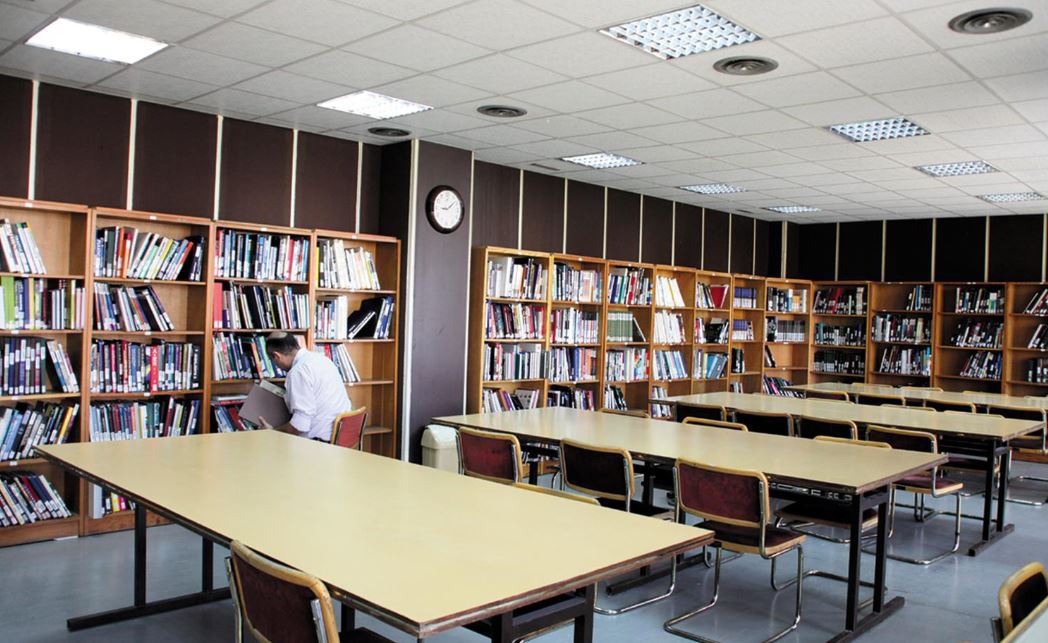
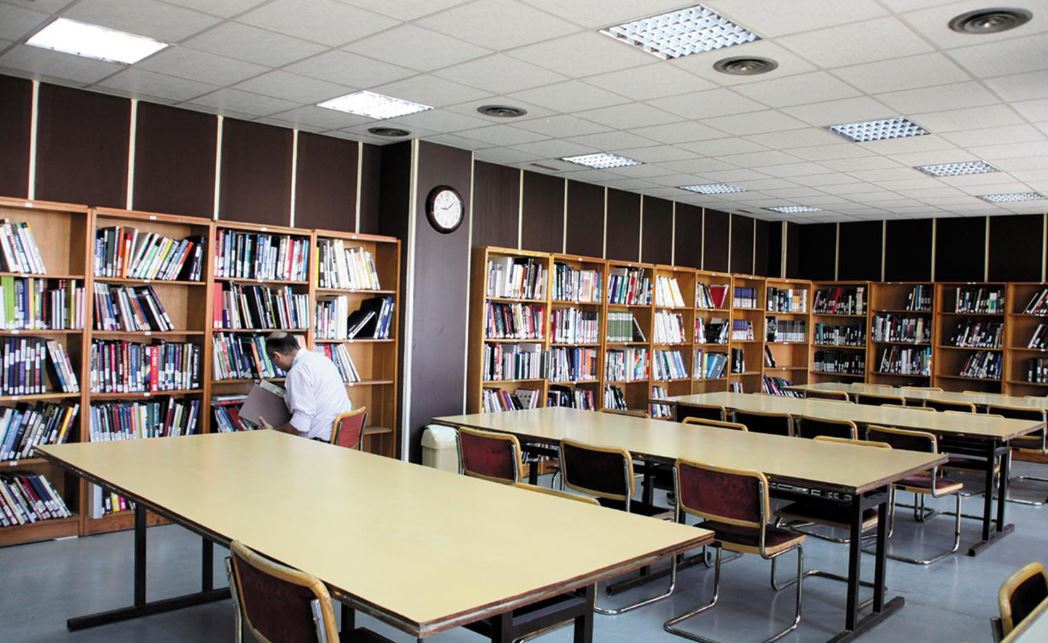
 Al-Assad National Library, located next to the Umayyad Square in Damascus - 29 April 2018 (Syrian Researchers Initiative)
Al-Assad National Library, located next to the Umayyad Square in Damascus - 29 April 2018 (Syrian Researchers Initiative)





 A
A
A
A
A
A



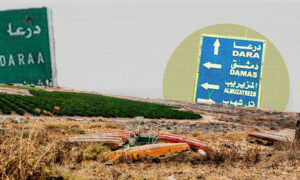
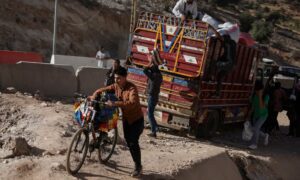
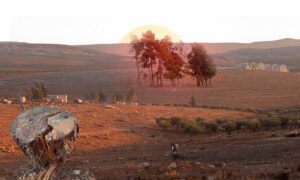
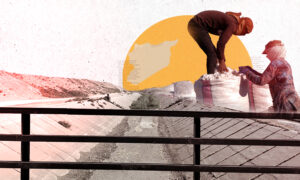
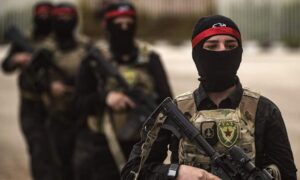
 More In-Depth
More In-Depth